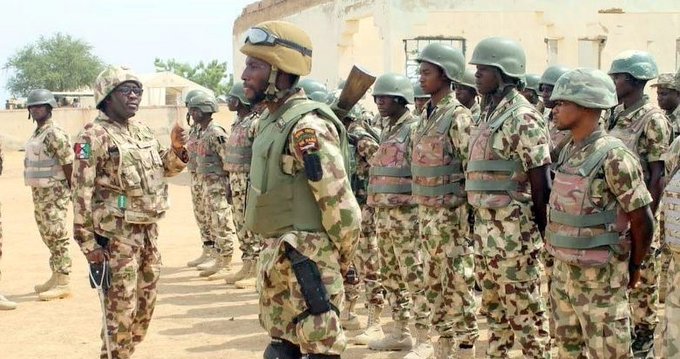In a move that underscores its zero-tolerance stance on misconduct, the Armed Forces of Nigeria has confirmed the arrest of 16 officers accused of indiscipline and violations of military service regulations. The announcement was made on Saturday in Abuja by Defence Headquarters, signaling a renewed effort by the Nigerian military to tighten internal discipline and restore public confidence in the institution.
The Arrests and Ongoing Investigations
According to the Defence Headquarters, the affected officers—whose names and ranks are yet to be disclosed—were taken into custody after preliminary findings suggested that they had engaged in acts deemed to contravene established codes of conduct. Officials said the arrests followed a series of internal audits and monitoring activities designed to detect lapses in discipline across formations and units nationwide.
A top-ranking military source, who spoke on condition of anonymity, revealed that the breaches ranged from insubordination to failure to comply with standing service orders. While stressing that investigations were ongoing, the source noted that none of the allegations involved treason or collaboration with external enemies.
“The Armed Forces will not compromise on discipline, which is the backbone of military effectiveness. Every officer, regardless of rank, is subject to the same rules. The officers in question will face orderly room trials and, if found guilty, appropriate sanctions,” the source said.
Why Discipline Matters in the Military
Military experts note that discipline is the cornerstone of any armed force. Without it, command structures weaken, operational efficiency declines, and national security could be compromised.
Colonel (rtd) Hassan Ibrahim, a former Nigerian Army training officer, told reporters that breaches of service regulations, if left unchecked, can have ripple effects.
“Insubordination or failure to follow directives erodes the chain of command. If soldiers begin to question orders or act outside the rules, the entire system collapses. That is why the military comes down hard on indiscipline—it is not about punishment alone, but about safeguarding the entire force,” he explained.
Past Cases of Military Indiscipline in Nigeria
The Nigerian Armed Forces has a long history of cracking down on internal misconduct. In 2014, during the peak of the Boko Haram insurgency, several soldiers were court-martialed for mutiny after refusing to face terrorists in the northeast due to poor equipment. In 2017, the Nigerian Navy dismissed over 30 ratings for various disciplinary offenses, including desertion and misconduct.
In 2022, the Nigerian Air Force court-martialed and sentenced several officers over negligence and abuse of office. These incidents highlight how discipline remains a constant challenge within the system, especially during periods of intense operational deployment.
Public Perception and Civil-Military Relations
The announcement of the 16 officers’ arrest comes at a time when public scrutiny of the Armed Forces is high. With the military playing an expanded role in internal security operations—from combating banditry and insurgency to managing civil unrest—its credibility has become increasingly tied to perceptions of professionalism.
Analysts argue that visible disciplinary measures help to assure Nigerians that the Armed Forces are serious about accountability. At the same time, critics caution that the military must balance its disciplinary actions with transparency, ensuring that cases do not become tools for silencing internal dissent or whistleblowers.
Human rights groups have in the past accused the military of heavy-handedness in disciplinary matters, particularly where trials are conducted behind closed doors. They urge that due process and fairness be upheld in every case.
What Happens Next
Defence Headquarters confirmed that the 16 arrested officers will undergo thorough investigations before facing a military tribunal or court-martial, depending on the gravity of their offenses. Possible punishments under the Armed Forces Act include demotion, dismissal, loss of benefits, or imprisonment.
Military law experts say that the trials could last several weeks, as evidence must be presented before commanding officers and, in serious cases, reviewed by higher authorities.
“This is not just about punishing wrongdoing but sending a message to others that the military will not tolerate any form of misconduct,” a retired judge advocate explained.
The Bigger Picture: Reform and Professionalism
The arrests also reflect broader efforts within the Nigerian Armed Forces to modernize and enforce global standards of military professionalism. In recent years, the military leadership has emphasized ethics, discipline, and respect for human rights in its operations, especially given international partnerships with the United States, United Kingdom, and African Union forces.
Observers believe that consistent enforcement of internal regulations will not only strengthen operational effectiveness but also enhance Nigeria’s image abroad.
Conclusion
The arrest of 16 officers for alleged indiscipline and breach of service regulations is a clear reminder that the Armed Forces of Nigeria is determined to protect its core values of discipline, loyalty, and professionalism. While details of the allegations remain under wraps, the case is expected to shed light on how the military balances internal accountability with its wider national security obligations.
For now, the message from Defence Headquarters is unequivocal: no officer, regardless of rank or position, is above the law of service.














